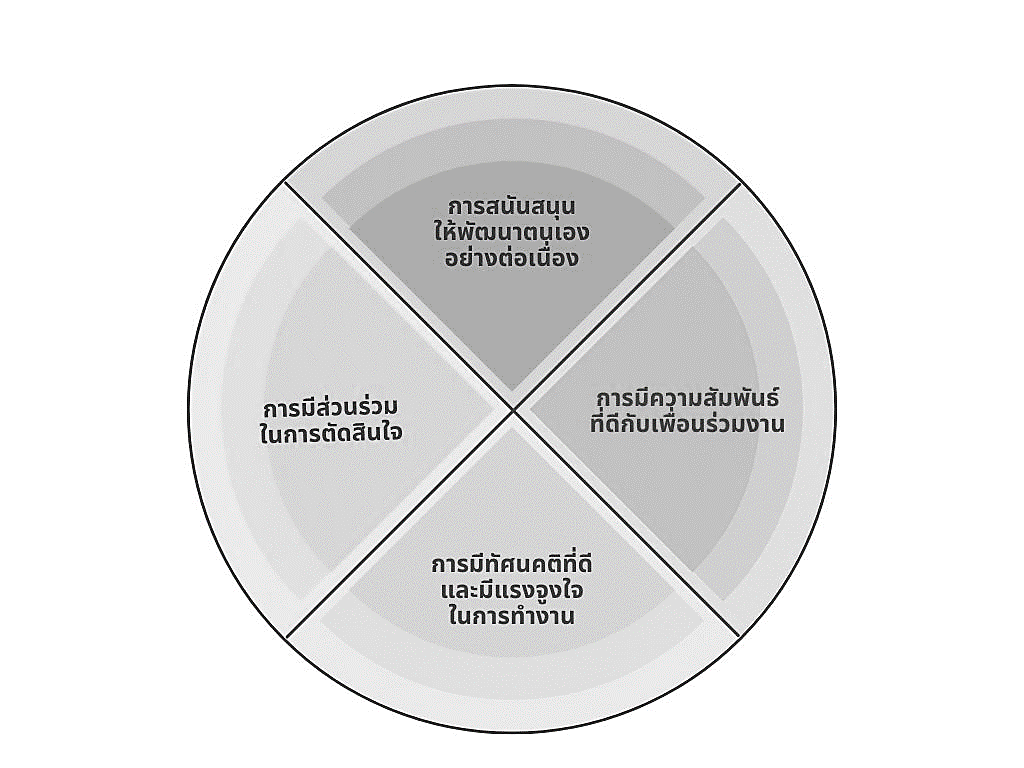Organizational Behavior of Happiness towards a Lifelong Learning Organization
Keywords:
Organizational behavior, Organizational happiness, Lifelong learning organizationAbstract
This academic article aims to present organizational behaviors that promote happiness in the workplace, fostering lifelong learning organizations. Based on the author’s studies and perspectives, the discussion encompasses organizational behavior, happiness in organizations, positive organizational behaviors, fostering organizational citizenship behaviors, lifelong learning, and sustainable lifelong learning organizations. These elements play a critical role in enhancing employee performance and organizational effectiveness. The study emphasizes analyzing individual and group behaviors within organizations, focusing on factors that influence job satisfaction and productivity. Establishing a happy organization is highlighted as a key management strategy to foster employee engagement and workplace happiness. This approach extends beyond financial rewards to include providing autonomy and continuous development opportunities. Furthermore, promoting organizational citizenship behaviors enhances cooperation and employee satisfaction, particularly through fostering positive relationships among employees. Happy organizational behaviors serve as a foundation for developing organizations into lifelong learning entities. Creating an open environment that supports psychological safety and positive interpersonal relationships is essential for a collaborative and productive workplace. To achieve lifelong learning, organizations must cultivate a learning culture through continuous skill development, training, knowledge sharing, and experiential learning. These efforts enable employees to adapt effectively to societal and economic changes. The integration of happiness creation and sustainable learning support strengthens employee motivation and commitment, contributing to organizational sustainability and competitiveness. Organizations that prioritize learning and skill development are better equipped to achieve long-term sustainability. The interplay between fostering happiness and enhancing employee potential underscores the necessity for organizations to balance both aspects for enduring success.
References
กัลยารัตน์ ธีระธนชัยกุล. (2562). พฤติกรรมองค์การ และการพัฒนาองค์การ. กรุงเทพฯ: ซีเอ็ดยูเคชั่น.
ปภาภัทร แสงแก้ว, พงษ์ศักดิ์ ผกามาศ และ ปรางทิพย์ เสยกระโทก. (2023). แนวทางการเสริมสร้างองค์การแห่ง ความสุขของสถาบันการอาชีวศึกษาในภาคใต้ของประเทศไทย: องค์การแห่งความสุขสถาบันการอาชีวศึกษา ประเทศไทย. วารสารวิจัยและนวัตกรรมการอาชีวศึกษา, 7(1), 78-88.
พจนีย์ จันที. (2563). พฤติกรรมการบริหารองค์การที่ส่งผลต่อปัญหาในการบริหารงบประมาณของคณะ บริหารธุรกิจ มหาวิทยาลัยเทคโนโลยีราชมงคลธัญบุรี (รายงานการวิจัย). กองทุนส่งเสริมงานวิจัย มหาวิทยาลัยเทคโนโลยีราชมงคลธัญบุรี.
ภัทรพล สายแวว. (2564). แนวทางการพัฒนาองค์กรแห่งความสุขในสถานศึกษายุคใหม่. วารสารการพัฒนาทรัพยากรมนุษย์, 4(1), 45-60.
ภัทรพล สายแวว. (2564). แนวทางการส่งเสริมองค์กรแห่งความสุขของสถานศึกษาสังกัดสำนักงานเขตพื้นที่การศึกษามัธยมศึกษาปทุมธานี. (วิทยานิพนธ์ปริญญาศึกษาศาสตรมหาบัณฑิต). ปทุมธานี: มหาวิทยาลัยเทคโนโลยีราชมงคลธัญบุรี.
สงบ อินทรมณี. (2562). การบริหารสถานศึกษาในยุคดิจิทัล. วารสารวิชาการมหาวิทยาลัยการจัดการและ เทคโนโลยีอีสเทิร์น, 16(1), 353-360.
สฎายุ ธีระวณิชตระกูล. (2547). การส่งเสริมพฤติกรรมการเป็นสมาชิกที่ดีต่อองค์การสู่การพัฒนาทรัพยากรมนุษย์ในองค์การอย่างยั่งยืน. วารสารศึกษาศาสตร์ มหาวิทยาลัยบูรพา, 16(1), 15-28.
อุทัยวรรณ ศรีรัตน์ และมัทนา วังถนอมศักดิ์. (2562). การเป็นโรงเรียนแห่งความสุขของโรงเรียนชุมชนบ้านหนอง ฝ้าย. (การค้นคว้าอิสระปริญญามหาบัณฑิต). กรุงเทพฯ: มหาวิทยาลัยศิลปากร.
Alayón, I. (2015). Happiness and business accomplishments. Diploma Work. (Diploma in Senior Management). Bogotá: Universidad Militar Nueva Granada. From http://repository.unimilitar.edu.co/bitstream/10654/13664/2/FELICIDAD%20Y%20LOG.
Baron, R. A., & Greenberg, J. (1990). Behavior in organizations: Understanding and managing the human side of work (3rd ed.). Allyn and Bacon.
Candy, P. C. (2019). Lifelong learning: A new perspective on adult learning. New York, NY: Routledge.
Cappelli, P. (2008). Talent on demand: managing talent in an age of uncertainty.
Daft, R. L. (2015). Organization theory and design. Cengage Learning Canada Inc.
DeNisi, A. S., Hitt, M. A., & Jackson, S. E. (2003). The knowledge-based approach to sustainable competitive advantage. Managing knowledge for sustained competitive advantage: Designing strategies for effective human resource management, 21.
Drucker, P. (1999). Management challenges for the 21st century. New York: Harper Business.
Fullan, M. (2007). Leading in a culture of change. John Wiley & Sons.
Garvin, D. A. (2016). Learning in action: A guide to putting the learning organization to work. Harvard Business Review Press.
Grant, A. M. (2013). Give and take: Why helping others drives our success. Viking.
Delmas, M. A., & Pekovic, S. (2013). Environmental standards and labor productivity: Understanding the mechanisms that sustain sustainability. Journal of Organizational Behavior, 34(2), 230-252.
Grose, V. L. (1987). Managing risk. Englewood Cliffs. NJ: Prentice-Hall.
Helliwell, J. F., & Putnam, R. D. (2004). The social context of well-being. Philosophical Transactions of the Royal Society B: Biological Sciences.
Jarvis, P. (2021). Adult learning in the social context. London: England Routledge.
Knowles, M. S. (2020). The adult learner: The definitive classic in adult education and human resource development. New York, NY: Routledge.
Lee C. Jarvis. (2017). Fringed versus felt: Feigning behaviors and the dynamics of Institutional logics. Academy of Management Review, 42(2).
Lyubomirsky, S. (2007). The how of happiness: A scientific approach to getting the life you want. Penguin Press.
Melamed, A. (2016). When a good salary is not enough to stay. Clafo.
Meyer, J. P., & Allen, N. J. (1991). A three-component conceptualization of organizational commitment. Human Resource Management Review, 1(1), 61-89.
Rousseau, D. M. (1997). Organizational behavior in the new organizational era. Annual review of psychology, 48(1).
Schuller, T., & Watson, D. (2004). The benefits of learning: The impact of education on health, family life and social capital. London, England: Routledge.
Seligman, M. E. (2011). Flourish: A visionary new understanding of happiness and well-being. Simon and Schuster.
Senge, P. M. (2006). The fifth discipline: The art and practice of the learning organization. Broadway Business.

Downloads
Published
How to Cite
Issue
Section
License
Copyright (c) 2024 Phayao University

This work is licensed under a Creative Commons Attribution-NonCommercial-NoDerivatives 4.0 International License.
ผู้นิพนธ์ต้องรับผิดชอบข้อความในบทนิพนธ์ของตน มหาวิทยาลัยพะเยาไม่จำเป็นต้องเห็นด้วยกับบทความที่ตีพิมพ์เสมอไป ผู้สนใจสามารถคัดลอก และนำไปใช้ได้ แต่จะต้องขออนุมัติเจ้าของ และได้รับการอนุมัติเป็นลายลักษณ์อักษรก่อน พร้อมกับมีการอ้างอิงและกล่าวคำขอบคุณให้ถูกต้องด้วย
The authors are themselves responsible for their contents. Signed articles may not always reflect the opinion of University of Phayao. The articles can be reproduced and reprinted, provided that permission is given by the authors and acknowledgement must be given.







